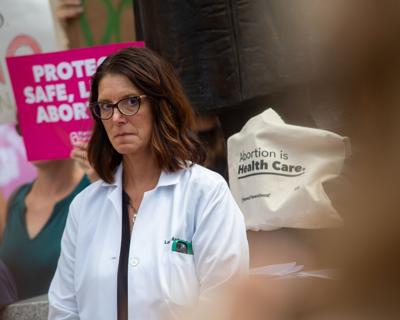It’s been approximately three years since the U.S. Supreme Court’s decision in Dobbs v. Jackson Women’s Health overturned Roe. v. Wade and put into motion Tennessee’s abortion ban.
Dr. Laura Andreson, a Williamson County OB/GYN of nearly two decades, hired a lawyer.
“There was just a lot of fear and a lot of confusion,” Andreson tells Scene sister publication the Williamson Scene, explaining that after Roe was overturned, she needed a legal expert to help her understand what procedures she could and couldn’t recommend to her patients.
“Nobody really knew what was happening, so I personally hired a criminal defense attorney.”
Tennessee’s restrictive abortion legislation leaves providers saying, ‘Please let me do my job’
Nearly three years after the trigger ban went into effect, Williamson County physicians say that they’ve seen the ban and its limited exceptions — for the risk of death or major irreversible impairment — deeply impact some wanted pregnancies and families experiencing child loss.
Dr. Michael DeRoche, a maternal-fetal medicine specialist in Williamson County, specializes in complicated and high-risk pregnancies. Many of DeRoche’s patients have nonviable pregnancies involving a fetus not expected to survive outside the uterus. Because Tennessee’s current laws allow for legal abortions only when the mother is in a “medical emergency,” many are forced to carry pregnancies they know are not viable until an emergency presents itself.
“My job is to help these women make the decision that's best for them and their family and not tell them what I believe, but guide them into what's best for them by giving them all the information I can,” DeRoche says.
“We can't do that anymore, and then we can't sometimes do these indicated deliveries that the woman should be delivered because of complications, and we can't do that till they're near death or they're going to lose an organ.”
This is often not what people think of when they consider the impact of abortion bans — but it is what has dominated the past three years of DeRoche's career.
“Women for years have said to me, ‘I don't believe in abortion, but I cannot do this to my baby, and I can't go through this and watch it die for two months,'” DeRoche says. “My job is to get these people through to that 40 weeks, because they can't do anything sooner, which is really awful.”
Because a mother must reach a “medical emergency” for a doctor to proceed with the termination of a pregnancy, DeRoche says this burden of proof forces doctors to watch their patients step in harm’s way for a pregnancy that will never result in a life. Putting women in danger for nonviable pregnancies, he says, risks an even greater loss of life.
“Mom wants two lives at the end of the pregnancy,” DeRoche says. “So I choose two lives. [But] if I can't get two, I want to get one out there. The state says, 'We want two lives, and if you can't get two lives ... we might charge you with a felony, and you might go to prison for 15 years.'”
The landscape surrounding exceptions for Tennessee’s abortion ban has changed somewhat during the past three years. The original exception was vague, leaving Andreson and other OB/GYNs scrambling to figure out what they could and couldn’t treat.
Planned Parenthood political arm announces pivot to election advocacy
“At that point, the law completely outlawed any abortion, including treating an ectopic pregnancy, which can kill a woman and will never result in a live birth," Andreson says. "It made us second guess if we could even treat miscarriage, because, well, how many ultrasounds do I need to prove that this fetus is not viable or not living?”
In April 2023, Gov. Bill Lee signed a law that allowed physicians to perform abortions in the case of molar or ectopic pregnancies, to remove a miscarriage and to save the life of the mother or prevent “irreversible impairment of a major bodily function” of the mother.
In September 2023, Andreson, who later ran for state House District 63, joined a lawsuit led by the Center for Reproductive Rights asking state courts to clarify what circumstances qualify as a “medical emergency.” Andreson, along with another physician and three patients, argued that the trigger ban’s vague language continued to put doctors and patients at risk.
An October 2024 ruling by the Davidson County Chancery Court states that abortion is permitted in specific situations, including severe preeclampsia, uterine rupture or potential loss of fertility.
During the most recent legislative session, lawmakers passed a bill hoping to absolve the state of this suit by clarifying these situations in the ban. Over the past three years, lawmakers have also attempted to implement additional exceptions in cases of rape, incest and fatal fetal anomalies, all of which have failed.
Opponents claim legislation is intended to absolve AG from physician-brought lawsuit
Despite some clarification on the ban’s exceptions, Andreson said that hinging life-saving care on legal jargon and forcing women to carry nonviable pregnancies doesn’t work for doctors. She argues that lawyers and lawmakers who don’t have medical knowledge don’t always know when the exact moment is that a mother’s life is being threatened — and can always question doctors in the aftermath whether they could’ve waited even a day more.
“We need to have the ability to treat our patients, because every time you're kind of hedging your bet on an exception, [and thinking] what if somebody looks at this in hindsight and says, ‘Well, maybe they shouldn't have done it in that situation, maybe they should have given it a little more time,’” Andreson says.
Today, Andreson and DeRoche say the state’s abortion ban impacts more than just those seeking abortions or with nonviable pregnancies. Andreson says, due to fears of legal action and the mental toll of working within exceptions and bylaws, she has seen several medical professionals leave Tennessee altogether.
“Quite a few of our maternal-fetal medicine doctors have left,” Andreson says. “Those doctors have the highest load of abnormal pregnancies, so I can completely understand why they leave.”
In addition, professionals are choosing not to train in Tennessee. In the 2023-24 application cycle, the first after the Dobbs decision, Tennessee saw a 21 percent drop in obstetric residency applications. Already, roughly half of Tennessee’s rural hospitals don’t provide obstetric services, and one-third of the state’s counties are considered “maternity care deserts.”
Andreson has also seen her patients adjust their own care since the ban took place. She says more patients are doing early genetic testing to decide whether they need to leave the state early in their pregnancy to receive an abortion without a medical emergency. She also says many patients have asked for permanent sterilization because they know they do not want to be pregnant.
“I've done more sterilization since June of 2022 than I did previously my whole career,” Andreson says. “That's fear-based. People are scared that if they got pregnant, they wouldn't have options.”
Federal actions may morph Tennessee’s reproductive care landscape even further. The Supreme Court recently ruled that states are able to exclude Planned Parenthood from their Medicaid programs, and the new federal budget strips the organization of significant federal funding.
After nearly three years of caring for her patients amid Tennessee’s abortion ban, Andreson finds that many don’t understand how wide-reaching its implications are — something she says is concerning.
“I don't think the general public realizes how catastrophic it truly is.”
A previous version of this article was published by Scene sister publication the Williamson Scene.








